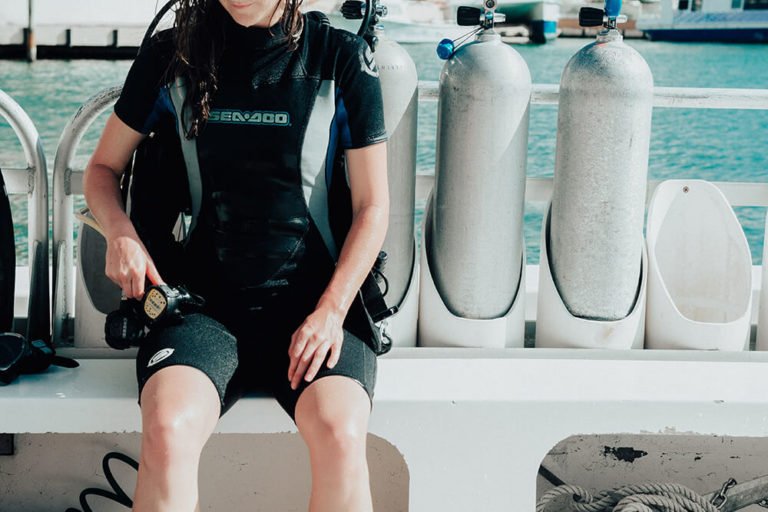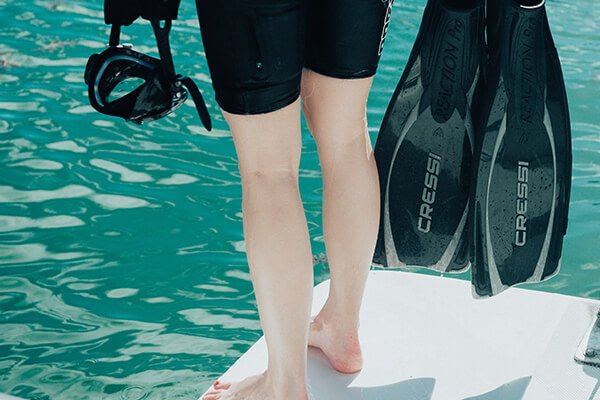Safely Running a Dive Shop in the Time of COVID-19

Your customers are eager to get back in the water and you’re eager to get your business moving again. But the threat of COVID-19 will be with us for some time yet and you can’t put them or your staff in danger. To operate safely again you need to minimize the risks as much as possible.
TAKING IT SERIOUSLY
Scuba diving is all about risk management – lives depend on being disciplined and meticulous, and so does your reputation. You’ll need to demonstrate through clear action and strict procedures that your establishment is trustworthy and takes the risks of COVID-19 infection seriously. That is the only safe way to make a recovery and return to something resembling normality.
SO, WHAT CAN YOU DO?
As a rule of thumb, when it doubt, consult the CDC guidelines for businesses and employers. Diving, however, is the sort of activity that poses some unique challenges. But let’s start with the basics.
TIPS FOR REDUCING EXPOSURE:
The use of face masks and hand-sanitizer is fundamental for direct contact with clients and a “no mask, no entry” store policy is advisable.
Limit the number of people in confined areas, use outdoor spaces as much as possible, and remind your clients to practice social distancing.
Designate certain areas such as the equipment room as strictly staff-only.
Avoid using fans and reduce airflow in the building to a minimum to prevent the dispersal of airborne droplets.
Before any diving or training session, ask clients whether they have any symptoms or have recently had contact with anyone known to be infected. If they answer yes, you should postpone the session or offer them a refund.
Clear masks with defog solution, not saliva. Spitting into a mask is not allowed as it can increase the risk of transmitting covid-19 – especially in a rented mask. Make sure the boat has enough defog solution to keep masks clear underwater.
TIPS FOR DISINFECTING:
While it is generally understood that the virus cannot survive in a properly treated swimming pool, you can’t assume that pool water is enough to clean your equipment after use. You need a disinfectant that meets the criteria defined by the EPA, and you’ll need to follow the manufacturer’s guidelines to determine the appropriate concentration of the solution.
Make disinfection a part of routine procedure for all equipment prior to a freshwater rinse to avoid contaminating the rinse tank. You’ll also need to remove the disinfectant from equipment before it is used again to prevent it being ingested or inhaled.
Be sure to keep returned rental equipment in a separate area until it has been through this disinfection process. If customers have handled new equipment in the shop, like trying on a mask or a wetsuit, you should store it safely for nine days.
Tell clients not to orally inflate their BCDs unless it’s an emergency as this could contaminate the inside of the bladder, which would be difficult to clean.
Ensure that any surface in frequent contact with people, such as countertops, door handles, toilets, and card machines, is decontaminated at regular intervals.

TIPS FOR BOAT DIVING:
Distancing precautions should always be observed on boats so the boat should never be filled. It is recommended to reduce boat capacity during this time so that divers can stay at least 6 feet apart. It’s best to make individually sealed lunches for divers – and to offer free sanitizer for hands and dive equipment on the boat.
Divers should wear face masks especially when the boat is moving since the virus could be carried to anyone sitting downwind of an infected person.
Scuba units should be fully assembled on shore and it’s a good idea to cover mouthpieces and snorkels with plastic or cloth to keep them clean prior to use. Remind your clients not to handle any gear other than their own and try to avoid letting their gear make contact with someone else’s.
TIPS FOR KEEPING DIVERS SAFE WHILE THEY SUIT UP AND DO A BUDDY CHECK:
Avoid touching customers or their gear as much as possible. Instead, encourage divers to put on all their equipment by themselves to allow for proper social distancing – this also minimizes the number of people who touch their gear.
Be sure to instruct divers to perform self-checks with their buddy, rather than switching mouthpieces during the normal buddy check. To do a self-check, divers can check their alternate air supply themselves while showing their body. Divers should show and explain to their buddy their releases and weights while they check them. After the diver has checked their alternate mouthpiece, it is advisable to clean it with a Dettol solution before diving in case it is needed during the dive.
SAFETY THROUGH DISCIPLINE
Following these recommendations will require extra effort and planning but it is essential to take every possible precaution. Unfortunately, the pandemic is likely to remain a fact of daily life until a vaccine is widely available but taking this kind of extra care and being strict about enforcing these procedures will slow the spread of the virus and ultimately save lives.
